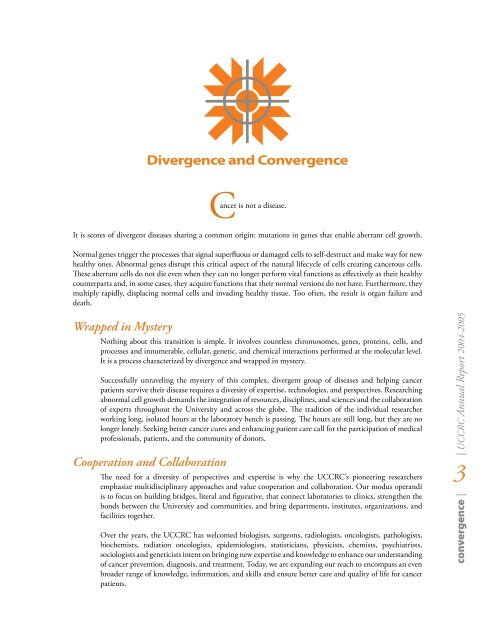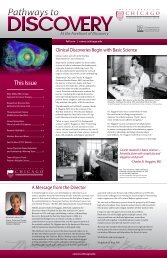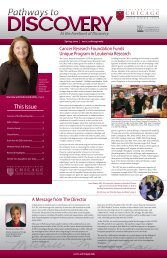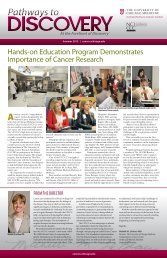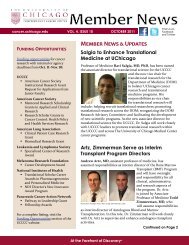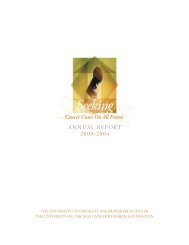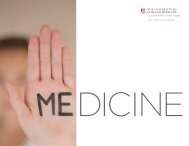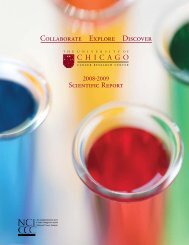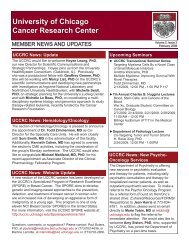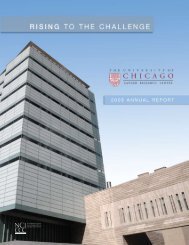convergence - The University of Chicago Medicine Comprehensive ...
convergence - The University of Chicago Medicine Comprehensive ...
convergence - The University of Chicago Medicine Comprehensive ...
- No tags were found...
Create successful ePaper yourself
Turn your PDF publications into a flip-book with our unique Google optimized e-Paper software.
Divergence and Convergence<br />
Cancer is not a disease.<br />
It is scores <strong>of</strong> divergent diseases sharing a common origin: mutations in genes that enable aberrant cell growth.<br />
Normal genes trigger the processes that signal superfluous or damaged cells to self-destruct and make way for new<br />
healthy ones. Abnormal genes disrupt this critical aspect <strong>of</strong> the natural lifecycle <strong>of</strong> cells creating cancerous cells.<br />
<strong>The</strong>se aberrant cells do not die even when they can no longer perform vital functions as effectively as their healthy<br />
counterparts and, in some cases, they acquire functions that their normal versions do not have. Furthermore, they<br />
multiply rapidly, displacing normal cells and invading healthy tissue. Too <strong>of</strong>ten, the result is organ failure and<br />
death.<br />
Wrapped in Mystery<br />
Nothing about this transition is simple. It involves countless chromosomes, genes, proteins, cells, and<br />
processes and innumerable, cellular, genetic, and chemical interactions performed at the molecular level.<br />
It is a process characterized by divergence and wrapped in mystery.<br />
Successfully unraveling the mystery <strong>of</strong> this complex, divergent group <strong>of</strong> diseases and helping cancer<br />
patients survive their disease requires a diversity <strong>of</strong> expertise, technologies, and perspectives. Researching<br />
abnormal cell growth demands the integration <strong>of</strong> resources, disciplines, and sciences and the collaboration<br />
<strong>of</strong> experts throughout the <strong>University</strong> and across the globe. <strong>The</strong> tradition <strong>of</strong> the individual researcher<br />
working long, isolated hours at the laboratory bench is passing. <strong>The</strong> hours are still long, but they are no<br />
longer lonely. Seeking better cancer cures and enhancing patient care call for the participation <strong>of</strong> medical<br />
pr<strong>of</strong>essionals, patients, and the community <strong>of</strong> donors.<br />
Cooperation and Collaboration<br />
<strong>The</strong> need for a diversity <strong>of</strong> perspectives and expertise is why the UCCRC’s pioneering researchers<br />
emphasize multidisciplinary approaches and value cooperation and collaboration. Our modus operandi<br />
is to focus on building bridges, literal and figurative, that connect laboratories to clinics, strengthen the<br />
bonds between the <strong>University</strong> and communities, and bring departments, institutes, organizations, and<br />
facilities together.<br />
Over the years, the UCCRC has welcomed biologists, surgeons, radiologists, oncologists, pathologists,<br />
biochemists, radiation oncologists, epidemiologists, statisticians, physicists, chemists, psychiatrists,<br />
sociologists and geneticists intent on bringing new expertise and knowledge to enhance our understanding<br />
<strong>of</strong> cancer prevention, diagnosis, and treatment. Today, we are expanding our reach to encompass an even<br />
broader range <strong>of</strong> knowledge, information, and skills and ensure better care and quality <strong>of</strong> life for cancer<br />
patients.<br />
<strong>convergence</strong> | | UCCRC Annual Report 2004-2005


